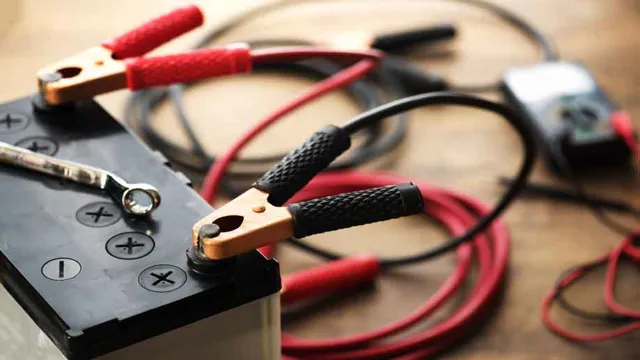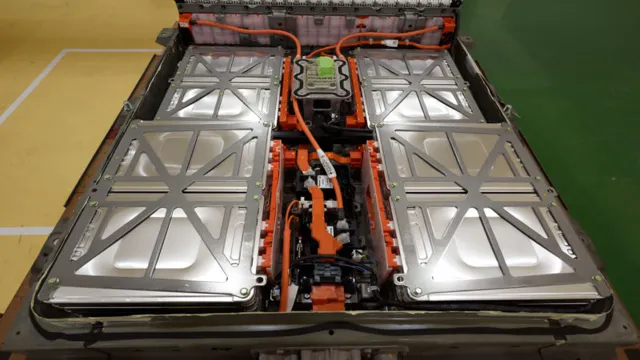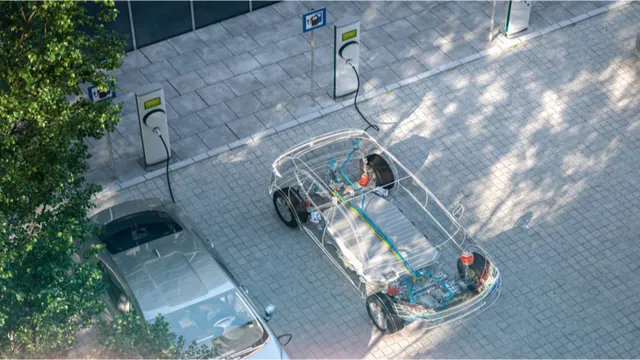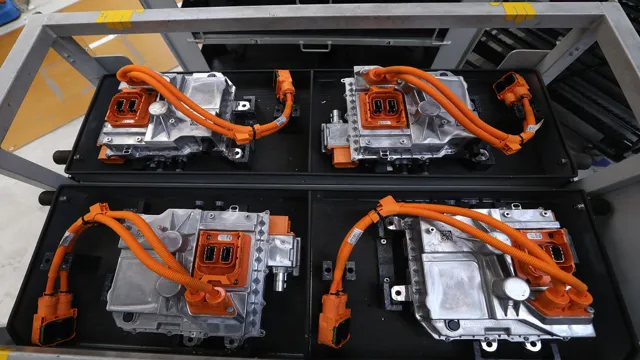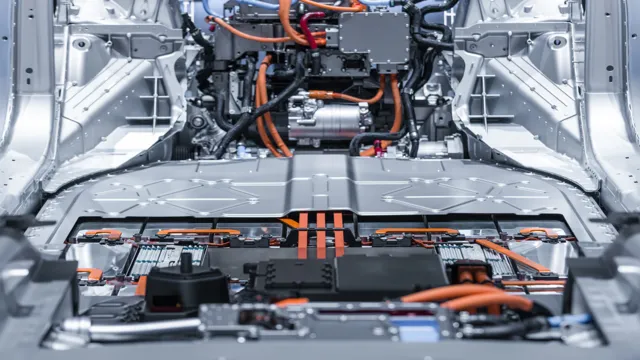Electric Car Battery Maintenance: Avoiding Discharge While Parked
Electric Car Batteries Discharge: Fact or Myth? Electric cars have become a popular alternative to traditional gasoline-powered vehicles. Along with their eco-friendliness and low cost of maintenance, electric cars are known for their efficient battery system. However, there are still several myths surrounding the batteries of electric cars, the most common one being the idea that they discharge quickly.
So, is it true that electric car batteries discharge quickly? The truth is, it depends. A lot of factors come into play when it comes to the battery life of an electric car. For instance, extreme weather conditions such as extreme cold or heat can greatly affect the performance of the battery.
Additionally, how you drive your electric car plays a significant role in determining how long its battery lasts. It’s important to note, though, that the lifespan of an electric car battery has improved significantly over the years. With newer models, the battery life has become more efficient, and efforts have been made to address any concerns when it comes to discharging.
In this blog post, we’ll be exploring the world of electric car batteries, from how they work to what affects their lifespan. We’ll also be dispelling some of the myths surrounding electric car batteries and helping you make informed decisions when it comes to choosing an electric vehicle. So, buckle up and join us as we take a deep dive into the world of electric car batteries and uncover the truth behind the myth of quick discharge.
Battery Self-Discharge
Electric car batteries have made tremendous strides in recent years, but one question that commonly arises is whether they discharge while not in use. The answer is yes, they do. Even when your electric car is parked and turned off for a prolonged period, the battery will continue to discharge due to a process called self-discharge.
This happens because the cells in the battery gradually lose their charge when they are inactive, especially if they are exposed to high temperatures. The rate at which self-discharge occurs varies among different types of batteries, with higher-capacity batteries having a slower rate of discharge than lower-capacity batteries. Therefore, it’s essential to keep your electric car’s battery charged regularly, even when you’re not using it.
You can also take some preventive measures to slow down the discharge process, such as storing your car in a cool environment and disconnecting the battery when it’s not in use.
How Batteries Lose Charge Over Time
Battery self-discharge is a natural phenomenon that causes batteries to lose charge over time. Even when you’re not using your devices, your batteries are slowly losing energy. This happens because batteries are made of different materials that react with each other, producing small amounts of electricity that gradually discharge the battery.
The rate of self-discharge varies depending on the type of battery, its age, and the storage conditions. For instance, a brand-new alkaline battery can lose up to 2% of its charge per year, while a lead-acid battery can lose up to 10% per month. Extreme temperatures, humidity, and long storage periods can accelerate self-discharge and reduce the overall lifespan of the battery.
It’s important to keep this in mind when storing your batteries or planning to use them after a long period of time. Always check the charge level before using them to ensure they will work as expected and avoid unexpected failures.
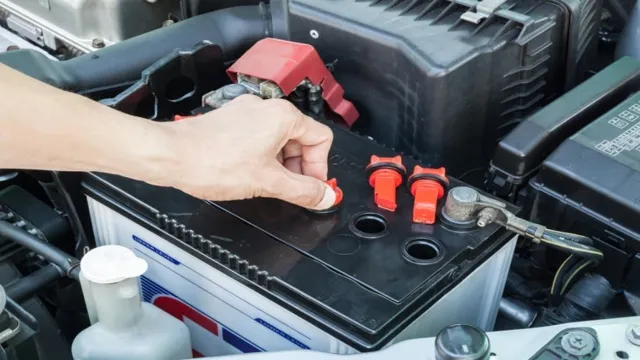
Electric Car Battery Lifespan
If you own an electric car or are considering purchasing one, you may have wondered if the battery will discharge when not in use. The answer is yes, but at a much slower rate than a conventional car battery. Electric car batteries are designed to maintain a decent charge level even when the vehicle is not in use, typically losing only around 5% of their charge per month.
However, it is still advisable to keep the battery connected to a charger when the car is not in use for an extended period of time. This will help maintain the health and lifespan of the battery. It’s important to note that the lifespan of an electric car battery also depends on factors such as temperature and usage.
High temperatures can significantly decrease the battery’s lifespan, while overusing the battery and frequently depleting it to low levels can also reduce its lifespan. Overall, taking care of an electric car battery when not in use can help ensure it lasts for many years of driving enjoyment.
Factors Affecting Battery Life
Electric car battery lifespan is a critical factor that affects the overall performance of electric cars. The battery of an electric car is made up of several cells that convert chemical energy into electrical energy. However, over time, the capacity of these cells decreases, which affects the range and overall performance of the car.
Factors such as temperature, driving habits, and charging habits also play a significant role in determining the lifespan of electric car batteries. Extreme temperatures can cause degradation of the battery, while bad driving habits such as rapid acceleration and frequent hard braking can also reduce battery life. Proper charging habits such as not overcharging or undercharging the battery can also help maintain its lifespan.
In summary, electric car battery lifespan is influenced by several factors that must be considered to ensure the car’s longevity and optimal performance.
Tips for Prolonging Battery Life
As electric cars become more common, many drivers are concerned about the lifespan of the battery. After all, replacing the battery is one of the most expensive parts of owning an electric car. The good news is that with proper care, electric car batteries can last for many years.
One way to prolong the life of your battery is to avoid extreme temperatures. Batteries don’t perform well in very hot or very cold temperatures, so it’s important to park your car in a cool, shaded area when possible. You can also avoid rapid charging, as this can cause excess heat which can damage the battery cells.
Instead, try to keep your battery level between 20% and 80% and charge it slowly over several hours. By taking these simple precautions, you can help ensure that your electric car battery lasts as long as possible.
Storing an Electric Car Battery
If you’re an electric car owner, you may be wondering if your car battery will discharge when not in use. The short answer is yes. While electric car batteries are designed to hold a charge for a long time, they do lose some charge when they’re not being used.
This is because even when the car is idle, the battery is still providing power to the car’s systems, such as the onboard computer and the alarm system. To minimize the amount of charge lost, it’s important to store your electric car properly. One tip is to store it in a cool, dry place and to keep it fully charged.
You can also invest in a battery storage system or trickle charger to help keep the battery charged. This will not only help preserve the life of your battery but also ensure that your car is always ready to go when you need it.
How to Properly Store Batteries
When it comes to storing an electric car battery, it’s important to take the necessary precautions to ensure its longevity and performance. One key factor is to store the battery at a moderate temperature, as extreme heat or cold can damage the cells over time. It’s also important to maintain a charge level of around 50-60%, as a fully charged or completely discharged battery can also lead to degradation.
Additionally, it’s recommended to remove the battery from the car if it will be stored for an extended period of time. Proper storage and maintenance can significantly extend the lifespan of an electric car battery, giving you a more reliable and efficient driving experience. So, whether you’re taking a break from driving or simply need to store your electric car battery for a while, make sure to follow these guidelines to keep it in peak condition.
Do Electric Car Batteries Discharge While Stored?
One common concern among electric car owners is whether or not their batteries will discharge while they’re stored. The short answer is yes, but at a very slow rate. Electric car batteries use a small amount of power even when the car is turned off to maintain their state of charge, and this can result in a gradual discharge over time.
However, most electric cars have a feature called “sleep mode” that activates after a certain period of inactivity, which reduces the amount of power the battery uses to maintain its charge and prevents excessive discharge. Additionally, many electric car manufacturers recommend storing the vehicle with the battery at a specific state of charge, typically around 50%, to reduce the risk of damage or excessive discharge. Overall, it’s important to keep in mind that while electric car batteries will discharge while stored, the rate is very slow and can be managed with proper storage techniques.
Conclusion
In conclusion, the answer to the question of whether electric car batteries discharge when not in use is a resounding yes. Just like any electronic device, electric car batteries have self-discharge rates and can lose some of their charge over time. However, keeping your battery charged regularly and maintaining it properly can prolong its lifespan and ensure that your electric vehicle is always ready to hit the road with full power.
So, just like you wouldn’t leave your phone on a shelf for months without charging it, it’s important to take care of your electric car battery to get the most out of it. Let’s keep our EV’s charged and our puns fully charged too!”
FAQs
What happens to electric car batteries when not in use?
Even when an electric car is not in use, its batteries will slowly discharge over time. This is known as self-discharge and can lead to reduced battery capacity if left unchecked.
How can I prevent my electric car battery from discharging when not in use?
To prevent self-discharge, it is recommended to keep your electric car plugged in when not in use. This will allow the battery’s management system to maintain a charge level that is optimal for long-term battery health.
Can leaving an electric car unplugged for an extended period of time damage the battery?
Yes, leaving an electric car unplugged for an extended period of time can damage the battery. This is because the battery’s charge level may drop too low, leading to reduced capacity and potentially permanent damage.
How often should I charge my electric car if I am not driving it regularly?
If you are not driving your electric car regularly, it is recommended to charge it at least once every two weeks. This will help to maintain the battery’s charge level and prevent self-discharge from causing damage.

